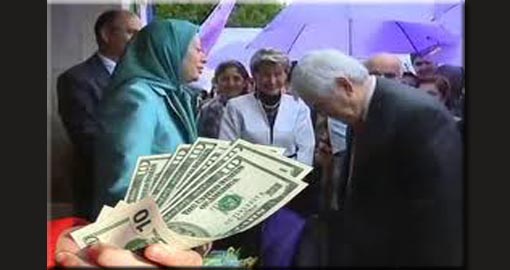Newt Gingrich, who is being vetted to be Donald Trump’s running mate and appeared with the candidate in Cincinnati on Wednesday, left the campaign trail this weekend for an unusual reason. The former speaker of the House had to fly to Paris to appear at a gala celebration for the Mojahedin-e Khalq, or People’s Mujahedin, an Iranian exile group that wants Washington’s backing for regime change in Iran.

In his remarks, Gingrich heaped praise on the MEK’s efforts and congratulated the group on the presence of another dignitary, Prince Turki al-Faisal, a senior member of the Saudi royal family and former head of that nation’s intelligence service.
What Gingrich failed to mention in his enthusiastic endorsement of the MEK, however, is that the Iranian dissidents previously spent three decades trying to achieve their aim through terrorist attacks, and some of their first victims were Americans. He also avoided talking about the fact that the group’s terrorist cell was once based in Iraq, where it was armed and protected by Saddam Hussein.
The timing of Gingrich’s appearance at the MEK gala was awkward for Trump, since the candidate had spent part of the previous week arguing that the late Iraqi dictator, while being “a really bad guy,” deserved some credit because “he killed terrorists.”
“He did that so good,” Trump told supporters in North Carolina on Tuesday. “They didn’t read them the rights; they didn’t talk; they were a terrorist, it was over.”
Four days later, Gingrich reminded the world that Saddam, in fact, had a history of support for terrorist groups like the MEK, whose members helped foment the 1979 revolution, in part by killing American civilians working in Tehran, and then lost a bitter struggle for power to the Islamists. After they were forced to flee Iran in 1981, the MEK’s members set up a government-in-exile in France and established a military base in Iraq, where they were given arms and training by Saddam as part of a strategy to destabilize the theocratic government in Tehran that he was at war with.
In recent years, as The Intercept has reported, the MEK has poured millions of dollars into reinventing itself as a moderate political group ready to take power in Iran if Western-backed regime change ever takes place. To that end, it lobbied successfully to be removed from the State Department’s list of foreign terrorist organizations in 2012. The Iranian exiles achieved this over the apparent opposition of then-Secretary of State Hillary Clinton, in part by paying a long list of former United States officials hefty speaking fees of between $10,000 to $50,000 for hymns of praise like the one Gingrich delivered on Saturday in Paris, where the MEK’s political wing held its annual “Free Iran” gala.
But, according to Ariane Tabatabai, a Georgetown University scholar, the “cult-like dissident group,” whose married members were reportedly forced to divorce and take a vow of lifelong celibacy, “has no viable chance of seizing power in Iran”:
If the current government is not Iranians’ first choice for a government, the MEK is not even their last — and for good reason. The MEK supported Saddam Hussein during the Iran-Iraq War. The people’s discontent with the Iranian government at that time did not translate into their supporting an external enemy that was firing Scuds into Tehran, using chemical weapons and killing hundreds of thousands of Iranians, including many civilians. Today, the MEK is viewed negatively by most Iranians, who would prefer to maintain the status quo than rush to the arms of what they consider a corrupt, criminal cult.
Despite how little reality there is behind the claim that the MEK’s political wing, the National Council of Resistance of Iran, is a force for democratic change, Gingrich was joined at the group’s gala in Paris by a bipartisan group of former U.S. officials, including former U.N. ambassadors John Bolton and Bill Richardson, a former attorney general, Michael Mukasey, the former State Department spokesperson P.J. Crowley, the former Homeland Security Adviser Frances Townsend, the former Congressman Patrick Kennedy, and the former Vermont governor Howard Dean. The gala was even hosted by Linda Chavez, a former Reagan administration official who has loudly opposed Donald Trump’s nomination.
As Gingrich noted, however, perhaps the most important speaker at the MEK gathering this year was the Saudi royal, Prince Turki al-Faisal.
Although the rivalry between Saudi Arabia and Iran is not new, Prince Turki’s speech to the dissident group seemed like a departure to many Iranians, not least because it was marked by the bizarre spectacle of the Iranian exiles interrupting his address to chant, in Arabic: “Al Shaab Yureed Isqat al-Nitham!” — “The People Demand the Fall of the Regime!”
Video of this moment, broadcast on Al-Arabiya, the Saudi-owned satellite news channel, showed Prince Turki respond: “I, too, want the fall of the regime.”
The comment, an open call for regime change in Tehran from a Saudi royal, struck Iranian journalists and activists as a turning point. It was also deeply ironic, given that the chant was used in the pro-democracy protests across the Middle East in 2011 that Saudi Arabia fought so hard to repress.
By Robert Mackey – the Intercept

